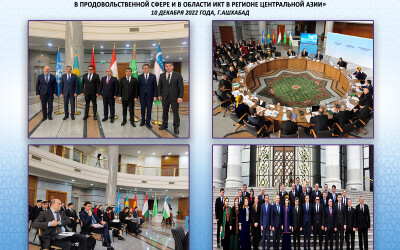ISRS: It is important for the states of Central Asia to jointly form a regional agenda to solve problems

Tashkent, Uzbekistan (UzDaily.com) -- It is important for the states of Central Asia to jointly form a regional agenda to solve problems, First Deputy Director of the Institute for Strategic and Interregional Studies under the President of the Republic of Uzbekistan Akramjon Nematov said during the next Central Asian Expert Forum (CAEF) "Actual aspects of regional cooperation on climate change, water use, issues of ensuring security in the food sector and in the field of ICT in the Central Asian region”, held on 10 December 2022 in Ashgabat.
The agenda of the event included issues of building up practical cooperation in the region in the field of climate change, rational use of water resources, ensuring food and information security.

During the forum, the representative of the ISMI emphasized that today CAEF has gained a stable character, has become a traditional and popular platform for expert interaction. This platform allows, in the context of a growing crisis in international political and economic relations, a lack of trust and dialogue, to consolidate the efforts of the countries of Central Asia in the joint search for mutually acceptable and adequate responses to the challenges our countries face.
Akramjon Nematov also noted that today, against the background of the negative impact on our region of geopolitical tensions, the decline in global trade, the difficulties associated
With the functioning of transport communications and limited access to markets, it becomes important for the states of Central Asia to jointly form a common regional agenda and make coordinated decisions in order to strengthen stability, security and sustainable development of the region.
In this context, the expert identified a number of problems that directly affect the interests of Central Asia, which require the consolidation of efforts and the development of common measures, in particular in the field of ensuring food security. It was noted about the observed increase in prices for a number of goods and services, and primarily for food.
As the representative of the ISMI noted, this is due to a number of factors.
First, the high dependence on food imports makes the countries of the region vulnerable to price fluctuations in external markets. This significantly affects the region, which buys from 10% to 70% of food. In 2021, the Central Asian countries imported similar goods worth US$7 billion. According to the ADB, in the first half of this year. growth in food prices in Central Asia amounted to 14.2%.
Secondly, the region is increasingly exposed to environmental degradation, which is manifested in increased rates of desertification and salinization of previously fertile soils. According to the UN, today 37% of the land in Central Asia is degraded. With a further deterioration in their condition, a reduction in crop yields by 20-40% is expected, which, in the context of population growth, can cause a food crisis.
– In such a situation, it is necessary to consolidate around the solution of specific and relevant tasks for all, since “food security is global in nature, respectively, and it can only be supported collectively,” said Akramjon Nematov.
Taking into account the experience of Uzbekistan, the First Deputy Director of the ISMI drew the attention of the forum participants to key areas of cooperation that will contribute to solving food security problems.
First of all, in his opinion, it is necessary to review the existing trade policy in the food sector. An important measure in this regard is the liberalization of trade in food products. At the same time, as the expert explained, harmonization of technical regulations in the field of agriculture, food and processing industries can also act as an effective mechanism for expanding trade.
Another important area, according to Akramjon Nematov, is the implementation of promising transport and communication projects. In this regard, the implementation of the project - the railway "Termez - Mazar-i-Sharif - Kabul-Peshawar", thanks to which the countries of the region will have new, alternative opportunities to enter the promising markets of South and Southeast Asia, was noted as being in demand.
The representative of ISMI also stressed the need for active innovation in agri-food systems. He noted that "smart" agriculture is now becoming the most important segment of the agricultural industry, as the use of smart technologies helps to increase yields and reduce production costs.
Experts predict that the introduction of new technologies will increase the productivity of world agriculture by 70% by 2050.
Akramjon Nematov also focused on the need to consolidate efforts to combat desertification, preserve biodiversity and ensure water balance, and promote green economy projects. Important measures in this regard, according to him, can be reforestation, active introduction of water-saving technologies into the agricultural sector, development and use of alternative energy sources.
Summing up his speech, A. Nematov stressed that the holding in 2023 under the auspices of FAO of the International Conference on Food Security could contribute to closer coordination of efforts in this direction. The event, initiated by the President of Uzbekistan, will allow a deeper assessment of the problems in the field of food security, develop timely and effective mechanisms to overcome them.
The event, organized by the Institute of International Relations of the Ministry of Foreign Affairs of Turkmenistan jointly with the UN Regional Center for Preventive Diplomacy for Central Asia (UNRCCA), was attended by Special Representative of the UN Secretary General, Head of UNRCCA Natalia German , heads and leading experts of strategic research institutions, think tanks of countries of Central Asia.
Previous

Ashgabat hosted the Central Asian Expert Forum (CAEF) on “Current aspects of regional cooperation on climate change, water use, food security and ICT in the Central Asian region”.
13.12.2022





